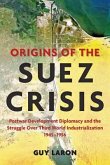The history of the Suez Canal is a fascinating tale of ambition, engineering, and geopolitics, spanning centuries. Here's an overview: Ancient Beginnings 1. Earliest Concepts: o The idea of connecting the Mediterranean and Red Seas dates back to ancient Egypt. Pharaohs such as Senusret III (Middle Kingdom, c. 1850 BCE) and Necho II (c. 610 BCE) attempted to dig canals linking the Nile River to the Red Sea. o A completed canal, known as the "Canal of the Pharaohs," is thought to have been constructed under the Persian king Darius I (6th century BCE). It followed a route connecting the Nile to the Red Sea via a series of natural waterways. 2. Decline and Revival: o Over centuries, the ancient canal fell into disuse due to siltation and neglect. o Successive rulers, including those of the Ptolemaic and Roman periods, reopened or modified parts of the canal for navigation and trade. Modern Development 1. Vision of a Direct Link: o In the 15th century, after the rise of European maritime powers, renewed interest in creating a direct sea route between Europe and Asia arose. However, the technological and political challenges delayed efforts. 2. Napoleon's Survey (1798): o During Napoleon Bonaparte's campaign in Egypt, French engineers surveyed the Isthmus of Suez. Although they incorrectly concluded that the Red Sea and Mediterranean were at different levels, this survey revived interest in the project. 3. Ferdinand de Lesseps and Construction: o The modern Suez Canal was spearheaded by the French diplomat and engineer Ferdinand de Lesseps. In 1854, de Lesseps secured a concession from the Ottoman viceroy of Egypt, Said Pasha, to construct the canal. o Construction began in 1859 and lasted for 10 years. It required immense labor, much of it conscripted Egyptian workers. o The Suez Canal officially opened on November 17, 1869. It was hailed as a marvel of engineering, drastically reducing the sea voyage between Europe and Asia by eliminating the need to circumnavigate Africa. Strategic Importance and Controversies 1. International Control: o The Suez Canal Company, owned by French and Egyptian interests, initially managed the canal. o In 1875, Britain purchased Egypt's shares in the canal to secure its control of the vital trade route to its empire, particularly India. 2. Egyptian Nationalization: o In 1956, Egyptian President Gamal Abdel Nasser nationalized the Suez Canal, asserting Egypt's sovereignty over the waterway and its revenues. o This move led to the Suez Crisis, where Britain, France, and Israel launched a military intervention. Intense international pressure, particularly from the United States and the Soviet Union, forced their withdrawal.
Hinweis: Dieser Artikel kann nur an eine deutsche Lieferadresse ausgeliefert werden.
Hinweis: Dieser Artikel kann nur an eine deutsche Lieferadresse ausgeliefert werden.








